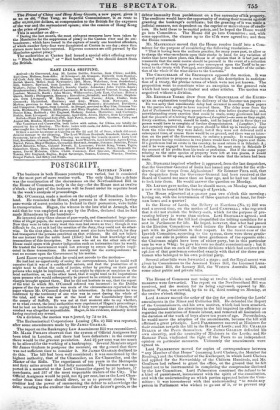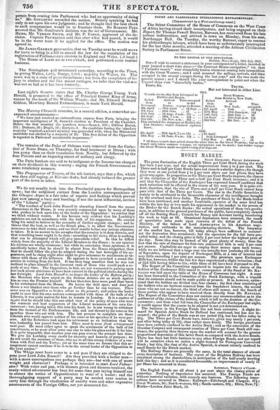The House of Commons met today at twelve o'clock ;
and several measures were forwarded. The report on the Newfoundland Bill was received, and the motion for its being engrossed, opposed by Mr. BAriteo WALL, was carried, by 64 to 21, third reading on Monday, at the twelve o'clock sitting.
Lord ASHLEY moved the order of the day for considering the Lords' amendments in the Mines and Collieries Bill. He defended the Report of the Commissioners, and his own motives, which had been attacked. He complained that the alterations in the bill impaired its efficiency as regarded the restriction of female labour, and removed all limitation on the duration of the work of boys above ten years of age. Nevertheless, he would move the adoption of the amendments, because the bill still affirmed a great principle. Lord PALMERSTON sneered at Ministers for their conduct towards the bill in the House of Lords ; and Mr. CHARLES BULLER at the Peers themselves. Sir JAMES GRAHAM defended his own sincerity, and the neutrality of Ministers in the Lords; and Sir ROBERT PEEL vindicated the right of the Peers to an independent opinion on particular measures. Ultimately the amendments were agreed to.
Lord PALmeesTost moved for copies of correspondence between "any Member of that House" (meaning Lord Chelsea, the Member for Reading,) and the Chancellor of the Exchequer, in which Lord Chelsea had applied for the Stewardship of the Chiltern Hundreds, and Mr. Goulburn had ref-used to grant the office, on the ground that he felt bound not to be instrumental in completing the compromise disclosed by the late Committee. Lord Palmerston construed the refusal to be a kind of punishment, inconsistent with the spirit of the constitution, and with the understanding on which parties appeared before the Com- mittee: it was inconsiseent with that understanding "to retain any person in Parliament who wished to go out of it, or to prevent any person from coming into Parliament who bad an opportunity of doing so." Mr. GOULBURN seconded the motion. Strictly speaking he had only to act upon his own judgment; and he thought that the best check to such compromises would be to frustrate them. Sir ROBERT PEEL avowed that Mr. Goulburn's decision was the act of Government. Mr. HOME, Mr. Watson SMITH, and Mr. P. YORKE, approved of the de- cision. Captain PLUMRIDGE said that after what had passed, it would be in the worst taste if he applied for the office. The motion was agreed to.
Sir JAMES Gustiest gave notice, that on Tuesday next he would move for leave to bring in a bill to amend the law for the regulation of the registration of Parliamentary electors in England and Wales. (A laugh.)
The House of Lords sat at two o'clock, and performed some routine business.



























 Previous page
Previous page